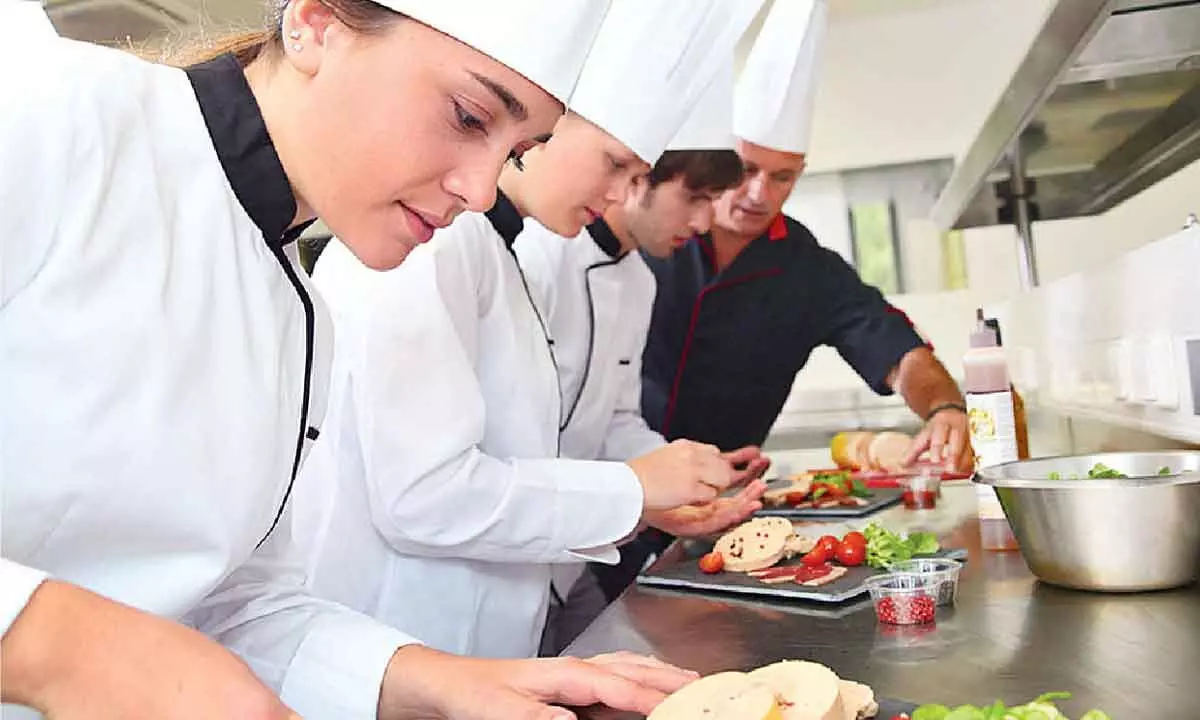The importance of culinary education

While it’s possible to climb the ranks in a kitchen without formal education, culinary training provides aspiring sous chefs with a solid foundation in cooking techniques, food safety, leadership, and global cuisine.
While it’s possible to climb the ranks in a kitchen without formal education, culinary training provides aspiring sous chefs with a solid foundation in cooking techniques, food safety, leadership, and global cuisine. It also offers networking opportunities and mentorship that can fast-track their careers. In an industry where competition is fierce and expectations are high, a culinary education can be the key to unlocking the full potential of an aspiring sous chef
In the fast-paced and competitive world of culinary arts, a sous chef plays a pivotal role in the success of any kitchen. Often considered the second-in-command after the head chef, the sous chef is responsible for the day-to-day management of the kitchen, ensuring smooth operations, and maintaining high standards. While passion and hands-on experience are essential ingredients for any successful chef, formal culinary education can provide the foundational knowledge and technical skills that set sous chefs apart in this highly demanding profession.
1. Building a Strong Foundation in Culinary Techniques
Culinary educationequips aspiring sous chefs with a comprehensive understanding of essential cooking techniques and methods. Whether it’s mastering the perfect knife skills, learning various cooking methods such as sautéing, grilling, or roasting, or understanding the importance of timing and precision, these foundational skills are essential for any sous chef to effectively lead a kitchen.
2. Learning Food Safety and Sanitation Standards
One of the most crucial responsibilities of a sous chef is ensuring the kitchen operates under strict food safety and sanitation regulations. A culinary education includes comprehensive training in food safety, proper storage techniques, and health regulations. Understanding these guidelines is critical not only to avoid health violations but also to protect the well-being of customers..
3. Developing Management and Leadership Skills
Beyond cooking, sous chefs must be effective leaders who can manage the kitchen staff, oversee kitchen operations, and communicate with other departments. While much of this leadership is learned through on-the-job experience, formal culinary education often includes courses on kitchen management, team dynamics, and communication skills.
In a high-pressure kitchen environment, clear communication and strong leadership are essential to ensure that orders are executed on time, food quality remains consistent, and any challenges are handled efficiently. Sous chefs are also often responsible for training and mentoring junior chefs, which requires not only technical expertise but also the ability to inspire and motivate others. Many culinary schools offer leadership development programs that help students hone these soft skills, which are just as important as their culinary prowess.
4. Gaining Exposure to a Variety of Cuisines and Cultures
One of the benefits of attending a culinary school is the exposure to a wide range of cuisines, ingredients, and cooking techniques from around the world. A sous chef needs to be well-versed in various culinary styles to work in diverse kitchens or develop creative and innovative menus.
Culinary schools often bring in guest chefs from different regions or offer international study programs, allowing students to learn firsthand about global culinary trends and practices. This cultural awareness is invaluable in today’s increasingly globalized food industry. It enables sous chefs to offer unique dishes and fuse flavors, giving the restaurant an edge in the competitive culinary market.
5. The Value of Networking and Mentorship
A culinary education doesn’t just provide technical skills; it also offers valuable networking opportunities.
Many culinary schools have partnerships with high-end restaurants, hotels, and catering companies where students can intern or apprentice. These internships provide practical experience and often lead to job offers upon graduation.
Additionally, culinary school instructors are typically seasoned professionals who have years of experience in the industry. They not only teach students the tricks of the trade but also serve as mentors, guiding them through their career journey. This network of contacts can be instrumental in helping aspiring sous chefs secure positions in top kitchens or gain access to exclusive culinary events.
6. Enhancing Career Advancement Opportunities
While hands-on experience is critical in the culinary world, a formal education can often open doors to higher-level positions more quickly. Many employers value the credibility and professionalism that come with a culinary degree or certification, especially for a role as critical as a sous chef.
A sous chef who has undergone formal culinary training is likely to have a more refined skill set and a broader knowledge base than one who has learned solely through experience. As a result, they are often better equipped to handle the complex challenges of managing a kitchen, developing new dishes, and ensuring consistent food quality.
This makes them more attractive to potential employers and increases their chances of advancing to a head chef position. While it’s possible to climb the ranks in a kitchen without formal education, culinary training provides aspiring sous chefs with a solid foundation in cooking techniques, food safety, leadership, and global cuisine. It also offers networking opportunities and mentorship that can fast-track their careers. In an industry where competition is fierce and expectations are high, a culinary education can be the key to unlocking the full potential of an aspiring sous chef.
(The author is Sous Chef Club Zion Gurugram)








